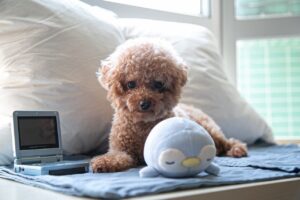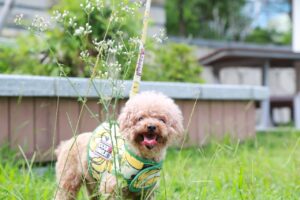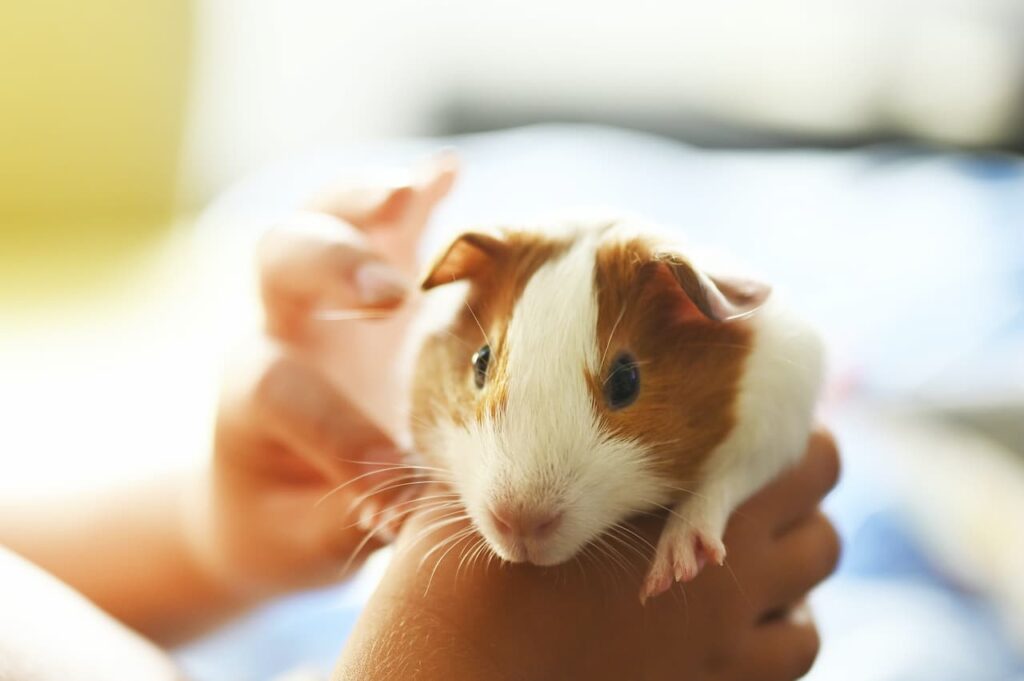The Teacup Poodle: Complete Guide
Teacup poodles, also known as toy poodles, are popular pets and often favored as companions for the elderly or those who prefer a pet that doesn’t take up too much space.
Table of Contents
ToggleThese pint size pooches may be small, but they have prominent personalities and are known for having keen intelligence and being highly sensitive to their owner’s emotions.
Read: The Blue Nose Pitbull
Their tiny size, cheerful attitudes, and intuitive natures aren’t the only reasons Teacup Poodles make great pets, though.
They are cute, curly, and smart, and if well cared for, they can live an impressively long time, with a life expectancy of 15-18 years!
Toy Poodles are officially recognized by the American Kennel Club, or AKC, just as their standard relatives are, though the toy versions were bred to be companions and house pets rather than hunting and sport.
The breed standard calls for the Toy Poodle to be tiny, no more than 7 pounds when fully grown, light on their feet, and agile.
A well-bred Toy Poodle will be alert and athletically capable, as even though they don’t look threatening, they can serve as excellent watchdogs.
There are multiple color patterns available in the Toy Poodle. The majority of them are a single, solid color; usually black, white, or apricot, which are the traditional and AKC accepted solids.
Read: The Cavapoo
There is also the option of a “party-colored” or multicolored pattern available, where the dominant base color is splashed with one or both of the others, giving the coat a fun, painted appearance.
Behaviour
Toy poodles are smart and known for being extremely loyal and devoted to their person or family.
Some toy poodle owners report that their pet is so attached to them that he or she experiences separation anxiety or a state of nervous tension triggered by their owner’s departure.
Having a Toy Poodle means having a constant companion, one who wants to be with you every waking moment and is happiest in the company of their human, so they can seem a bit clingy or needy if a person isn’t used to be accompanied from room to room.
They do not do well if left alone for long periods, so if your long work hours and have limited time to spend with a pet, the Toy Poodle is not for you.
Due to their natural inclination to be consistently close to the person they love, Toy Poodles are popular choices for senior citizens who may be struggling with loneliness and would benefit from the affectionate company.
Because they are small, they do well in small or limited spaces and can be great dogs for those living in apartments or small homes without large yards.
Although they are energetic, their size makes it possible for them to exercise indoors or in a confined outdoor area.
A Toy Poodle can comfortably run back and forth playing fetch in a living room or den without risking injury to themselves or collateral damage to home furnishings, while a Labrador or other, larger breed would not be able to do so.
Their size also make walks easy, as their short legs require them to take several strides for each of ours, causing them to burn off more energy in less time than large breeds.
They are very playful and can be extremely entertaining as they frolic about, romping with toys or other pets.
Toy Poodles are not known for being animal aggressive and typically do well with housemates such as cats, dogs, or other domestic animals.
Teacup Poodles are generally friendly, but like many toy breeds, they can become possessive and defensive of their people, which is another reason they make good watchdogs, however, because they are a toy breed, their bark is worse than their bite.
Toy Poodles may become timid or fearful if not well socialized early in their lives, so it is a good idea to expose them to different environments and experiences while they are puppies.
They can do well with children, but it is essential to remember that Toy Poodles are fragile and can be easily injured if not treated gently.
For this reason, small children should be supervised when playing with Toy Poodles.
Some Toy Poodles are also extremely vocal, which is beneficial in their capacity as a watchdog, but can also be a bit of an irritation, as they are likely to raise the alarm at anything they perceive to be unusual or potentially threatening, including passers by and other routine outdoor traffic.
Grooming
Teacup Poodles have hair, not fur like most dogs, which is what gives them their unique, fluffy appearance.
Their coat is usually soft, elegant, and curly, and can grow to be very thick if they are not kept clipped.
While it is not necessary to keep your Toy Poodle’s hair cut year round, and most people opt not to do a “show clip” even in summer, a “puppy cut” is a manageable haircut that will minimize mats and tangling and make your canine companion feel more comfortable, especially during warmer months.
Toy Poodles do not shed, as a rule, and on the rare occasion that they do loose a few hairs, the loss is so minimal as to be almost unnoticeable.
They are also hypoallergenic. Very few people have natural allergies to Poodles, making them an excellent choice for families with allergy sufferers who are unable to tolerate other pets.
Poodles do need semi-frequent baths, and as they are one of several breeds that grows hair inside of their ear canal, part of regular grooming for the Toy Poodle means having their ears plucked to prevent potential infections.
Teeth brushing is also recommended for this breed to decrease the incidence of severe tartar buildup, to which Toy Poodles seem to be quite prone.
Doggie toothbrushes are available at your veterinarian, and it is best to get your pet accustomed to the sensation of having their teeth brushed as puppies, even though their deciduous teeth are not permanent and, therefore, will not have a chance to acquire tartar.
Health
While a responsibly bred Teacup Poodle should be healthy and live many years, there are a few health problems that potential Poodle owners should be aware of.
Teacup Poodles frequently suffer from luxating patellas, a condition in which one or both kneecaps move out of position, making normal joint movement difficult.
Dogs with luxating patella will often demonstrate a periodic, partial limp or “skipping gait,” where normal ambulation alternates with bouts of favoring one rear leg over the other.
If both kneecaps are affected, both back legs can manifest the skipping gait, making it confusing for the owner to report where they are noticing their pets’ lameness.
Fortunately, most veterinarians are familiar with this condition and will palpate both knees to check for laxity before determining if their patient is suffering from this problem.
Dental disease is a common problem with Toy Poodles, who tend to accumulate a large amount of tartar and to do so much more quickly than most other breeds.
Regular, professional dental cleaning is a must for Toy Poodles to prevent tooth decay, gingivitis, tooth loss, and infection that can potentially affect other organs in the body, including the heart.
Owners of Toy Poodles should make a habit of looking at their pet’s teeth and monitoring their ability to chew comfortably.
If oral pain or an unpleasant odor is noted, it is time for a trip to the vet. Neglecting a Toy Poodle’s dental health can have serious consequences, so in this case, prevention is vital.
The long life span of the Toy Poodle means that they are more likely to suffer from chronic diseases or organ issues, not because these organs are congenitally flawed in the breed, but because they are likely to live long enough for them to experience old age related health issues and for their organs to yield to the effects of time.
Regular blood work is recommended, especially once your Toy Poodle is considered geriatric, to monitor for changes in their body that may adversely affect their life expectancy.
As puppies, Teacup Poodles can fall victim to hypoglycemia, a condition in which their blood sugar levels can drop dangerously low.
Until they are at least six months of age or four to five pounds, it is essential to feed your Teacup Poodle puppy more frequently than you would a large breed puppy or adult dog.
Small, frequent feedings work well for Toy Poodles.
Prevention of hypoglycemia will be discussed in greater detail later in the article.
Another consideration with Toy Poodle puppies is their potential inability to thermoregulate.
Low body weight makes it easy for toy breeds to get too cold, and they are susceptible to extremes of temperature.
No dog should be a backyard dog, but Toy Poodles especially do not thrive when exposed to the elements and should be kept in a temperature-controlled environment, namely indoors where they are warm, dry, and safe from predation by coyotes or other wild animals.
Diet
Teacup Poodles can quickly end up overweight because they are often overfed.
It is important to remember that small dogs have small stomachs and require fewer calories.
Your Toy Poodle does not have the same caloric requirement as a working or sporting dog.
It is important to measure out your dog’s food and ensure that they maintain a healthy body weight.
Most high-quality dog food brands offer “small breed/small bites” options, which work well for Toy Poodles.
Because they are prone to dental tartar, hard kibble is preferable to soft/wet diets for this breed, the theory being that a diet with a mechanical benefit to chewing may reduce tartar buildup.
Table scraps are not recommended for Toy Poodles and can lead not only to obesity but to GI upset and other medical problems such as pancreatitis.
Teacup Poodles can have very sensitive digestive tracts and should not be fed fatty foods or those that are high in cholesterol, such as red meat.
Giving your Toy Poodle a steak is not spoiling him or her, it is hurting them, and it can cause long term damage.
Hypoglycemia in small puppies is extremely common, so early in life, your Toy Poodle’s meals should be broken up into small, frequent feedings.
If your Toy Poodle weighs less than 2 pounds, you want to make sure he or she has something to eat every four to six hours until they grow large enough for their blood sugar to remain stable between meals.
Your veterinarian can also provide supplemental nutrition, usually a paste that can be offered every couple of hours, to tide your puppy over between feedings.
Dehydration can occur rapidly in an animal as small as a Toy Poodle, so it is extra important to make sure he or she is drinking enough water, even if it means you need to take your pet to the water bowl and remind them to drink.
Vomiting or diarrhea can lead to dehydration very quickly in toy breeds, so if you see either, don’t ignore it, see your veterinarian before your puppy’s reserves are depleted.
Exercise
As mentioned, Teacup Poodles expend more energy on a walk than their humans do because their shorter stature requires them to take more steps than a larger dog.
They are also able to run in confined spaces without colliding with furniture, so short walks are usually sufficient as long as their owner is willing to play and interact with them indoors, throwing toys or balls and making sure that their pet does not become bored.
Your Toy Poodle will enjoy spending time with you more than they enjoy anything else, so as long as they do get an opportunity to get fresh air, sunshine, and some cardiovascular activity, he or she will likely be content.


